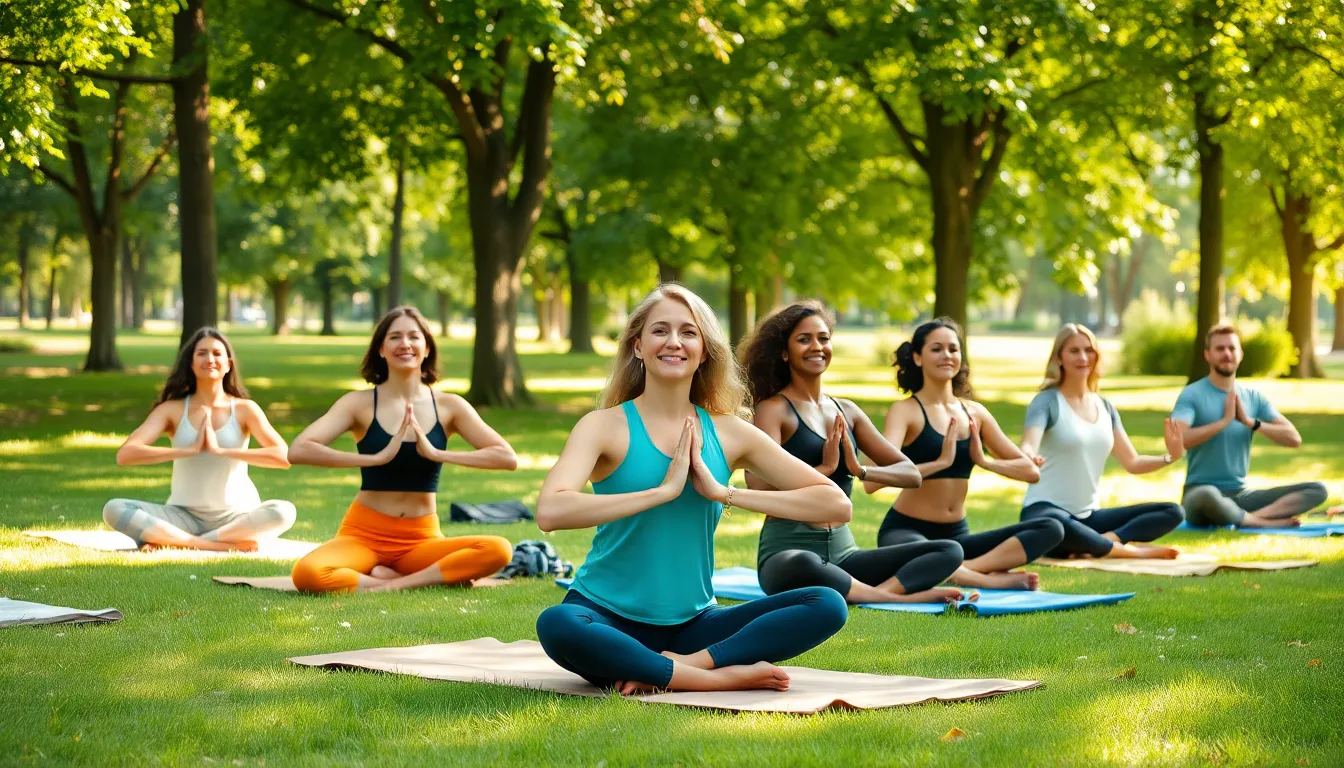In a world buzzing with chaos and deadlines, finding peace might feel like hunting for a unicorn. But what if he told them that cultivating peaceful habits could be as easy as sipping their morning coffee? Embracing tranquility doesn’t require a mountain retreat or a PhD in Zen; it’s about making small, intentional choices every day.
Table of Contents
ToggleWhat Are Peaceful Habits?
Peaceful habits are intentional practices that promote tranquility and reduce stress in daily life. Simple activities can transform an overwhelming atmosphere into a more serene environment.
Definition of Peaceful Habits
Peaceful habits consist of behaviors that foster calmness and clarity. Techniques like mindfulness, gratitude journaling, and deep breathing exercises cultivate a peaceful mindset. Incorporating these practices into one’s routine encourages a sense of balance and well-being. Moreover, making conscious choices, such as limiting media consumption or spending time in nature, supports emotional and mental health.
Importance of Peaceful Habits
Peaceful habits play a crucial role in enhancing overall quality of life. They contribute to reduced stress levels and better emotional resilience. Establishing these habits can improve focus and productivity, benefiting both personal and professional aspects. Evidence indicates that practicing peaceful habits leads to better physical health and improved relationships. Prioritizing these habits fosters a healthier, more fulfilling lifestyle.
Types of Peaceful Habits

Peaceful habits contribute significantly to overall well-being. They can take various forms, each offering unique benefits.
Mindfulness Practices
Mindfulness practices enhance awareness of the present moment. Techniques like meditation and mindful breathing cultivate focus and reduce distractions. Engaging in regular mindfulness exercises promotes calmness, leading to better stress management. Research indicates that only a few minutes of mindfulness daily can improve emotional resilience. Mindful eating encourages appreciation for food, fostering gratitude and joy. Such practices encourage a deeper connection with self and environment, creating a serene state of mind.
Physical Activities
Physical activities play a crucial role in achieving peace. Engaging in exercise releases endorphins, which naturally uplift mood and reduce anxiety. Activities such as yoga and tai chi combine movement with mindfulness, enhancing both physical and mental relaxation. Regular walking in nature can also provide a peaceful escape from daily chaos. Incorporating stretches throughout the day aids in releasing tension, promoting a calming effect. Establishing a routine with physical activity helps solidify peaceful habits, contributing to long-term well-being.
Healthy Routines
Healthy routines establish a foundation for peace in daily life. Prioritizing adequate sleep promotes mental clarity and emotional stability. Nutritious meals fuel the body, creating a balanced state that supports overall health. Regular hydration is essential; drinking enough water enhances focus and reduces stress. Scheduling downtime allows for reflection and rejuvenation, reinforcing feelings of tranquility. Consistent morning and bedtime rituals signal the body to unwind and prepare, solidifying an environment conducive to calmness. Integrating these habits fosters a lifestyle that naturally embraces peace.
Benefits of Adopting Peaceful Habits
Embracing peaceful habits leads to numerous advantages that enhance overall quality of life. These habits serve as essential tools for personal growth and well-being.
Mental Health Improvements
Mental health improves significantly through the practice of peaceful habits. Regular mindfulness exercises reduce anxiety levels, promoting a more balanced emotional state. Journaling gratitude fosters positive thinking, enhancing self-esteem and resilience. Engaging in deep breathing techniques alleviates stress and encourages relaxation, making individuals feel more centered. Research indicates that consistent practice of these habits can lead to lower incidences of depression and anxiety, ultimately fostering a healthier mindset.
Enhancements in Relationships
Relationships benefit when individuals cultivate peaceful habits. Effective communication flourishes in environments characterized by calmness and understanding. Mindfulness encourages active listening, enabling deeper connections with others. Practicing gratitude helps in appreciating loved ones, strengthening bonds through positive interactions. The reduction in stress from these habits allows individuals to respond to conflicts with clarity, fostering a peaceful atmosphere. Studies show that strong relationships enhance emotional support, leading to higher overall satisfaction in life.
Increased Productivity
Increased productivity often follows the adoption of peaceful habits. Focusing on mindfulness enables individuals to concentrate better, leading to improved work performance. Routine peaceful practices, like yoga and meditation, energize the mind, enhancing motivation and encouraging creativity. Reducing stress levels allows for clearer thinking and improved decision-making skills. Data confirms that those who prioritize well-being through peaceful habits experience more effective time management and a greater ability to meet personal and professional goals.
Tips for Developing Peaceful Habits
Developing peaceful habits involves intention, practice, and a commitment to change. By focusing on manageable steps, individuals can cultivate a sense of tranquility.
Starting Small
Starting small lays the foundation for sustainable change. Choose one habit, like five minutes of daily meditation. Gradually increase the duration once comfort sets in. Incorporating a single practice, such as deep breathing, fosters immediate calm. Small adjustments, like keeping a gratitude journal, can significantly impact mental well-being. Celebrating these small wins encourages further commitment to peaceful habits.
Establishing Routines
Establishing routines creates predictability and stability in daily life. Prioritize specific times for mindfulness practices or physical activities, such as morning yoga or evening walks. Incorporate healthy eating and hydration as part of the daily routine. Creating a structured schedule helps embed these habits into everyday life. Regularity in routines reinforces the benefits of peaceful habits. Consistent actions cultivate an environment conducive to peace.
Staying Consistent
Staying consistent is vital for long-term success with peaceful habits. Set reminders or use apps to track progress and maintain motivation. Engage with supportive communities or friends to share experiences and challenges. Adjustments to routines can keep practices fresh and engaging. Reflecting on the benefits experienced encourages ongoing commitment. Consistency transforms peaceful habits into a natural part of life, leading to greater overall tranquility.
Embracing peaceful habits can transform daily life into a more fulfilling experience. By making small intentional choices individuals can foster a sense of tranquility that permeates every aspect of their existence. The journey toward peace doesn’t require monumental changes but rather a commitment to consistency and mindfulness.
Incorporating practices like meditation gratitude journaling and mindful movement can significantly enhance emotional resilience and overall well-being. As individuals prioritize these habits they not only improve their mental health but also strengthen their relationships and boost productivity.
Ultimately cultivating peaceful habits is about creating a lifestyle that values calmness and balance. With dedication and practice anyone can embrace tranquility and enjoy a richer more harmonious life.




